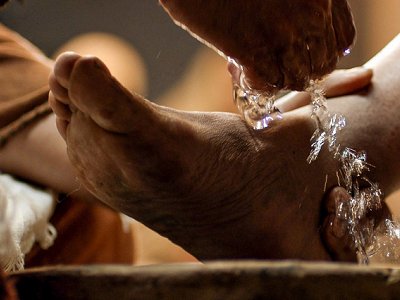
HOW TO WALK IN THE DARKNESS
At the very moment when he had reason to be preoccupied, Jesus performed an act of stunning symbolism which transformed our understanding of status
Only hours after his last meal, Jesus said to the mob sent to arrest him: ‘this is your hour, and the power of darkness’. For those who live in untroubled societies like ours, it is hard to get our minds round what it is like to be in the grip of evil. There is terrible personality to it, which defies reason. Anthony Loyd, a distinguished contemporary war correspondent, wrote of his encounter with a Serbian killing field in Bosnia in these terms:
And there was something more than what you saw, smelled and felt…the atmosphere. It chain-sawed through your senses…For whatever had been sucked out of that place, something else had been pumped in…Some empty black infinity...that spat and laughed.
It is impossible to make sense of such surroundings but it was just such an environment that enveloped Jesus and the disciples that last night. It is clear the disciples were in a place they could not understand and for which they were hopelessly unprepared and their experience stands as a warning against hubris in following Christ. Until the hour of darkness has come, we cannot be sure of the strength of our commitment; yet we must peer at this darkness to get the context we need to understand why Jesus did what he did at his last meal.
There was a calm purposefulness about Jesus towards the end. His final acts of teaching were dominated less by words and more by images. Symbolic acts have the ability to reach people in a way that words cannot. Not many of us remember the words that Nelson Mandela shared with others, but we remember his pulling on of a Springbok rugby shirt to signify a newly united nation.
As the darkness enfolded Jesus and his friends, he showed them how to live. We may not face the evil of a Bosnia, but we know that a society which turns away from God tends to harden its heart as a way of coping. This kind of hardness is in evidence today and we share in it. And part of the coping mechanism is to look after ourselves at the expense of others.
When Jesus took hold of the towel and the water, he demonstrated that those who follow him should make it their first goal to look after others. If there was a modern equivalent to foot-washing, I expect it would be cleaning the men’s urinals in a motorway service station on a hot summer’s day. If the God who made the stars whose brightness has taken millions of light years to reach us can stoop to this kind of work, we need a radical re-think on what both leadership and service really mean today.
The service he offered his friends was simple, unfussy and practical. It needed no special skills and so its ethic is open to everyone. The problem with a culture where people begin to look after their own interests in preference to others’ is that eventually a vicious circle is created whereby all lose out. When a community functions properly, we can have confidence in looking after other people’s needs because we know there is someone else who will look out for us at the same time. When people begin to look more to their own needs, we cannot be so sure that someone will look after us while we serve another and so selfishness creeps in. At first it seems a reasonable and logical step, to protect ourselves. In the end, it becomes a way of life which even receives endorsement.
To swim against this kind of current is demanding. A few years ago I left a concert at Wembley Stadium which a hundred thousand people had attended. I was carried down one of the giant walkways until I realised I was heading in the wrong direction. I had to turn back into the flow. At first I was carried back the other way; then I was able to stand my ground but it was some time before I could do anything else. Making progress was slow, ungainly and awkward. I was hit time and again and clearly resented by the unsuspecting people I was walking into. There are times in following Christ that he asks us to turn around and walk against the flow of the crowd. It isn’t at every point we have to do this, for we would soon be worn out unnecessarily, but when he asks us to, we must respond.
What does foot washing mean in our life? Some may be very familiar with the answer to this question, others may not. There may be a form of service waiting for us that we have never tried before; Jesus waited till the dying hours of his life to symbolise his way of service. The darkness may have surrounded him that night, but this meant the spotlight which fell on his act of foot-washing illuminated it with the brightness it deserved.
We are compelled to make a response to the sacrifice of Christ, but can only really take up that cross if we have decided how to wash human feet.
POPULAR ARTICLES

Obama's Covert Wars
The use of drones is going to change warfare out of all recognition in the next decades.

Through A Glass Starkly
Images of traumatic incidents caught on mobile phone can be put to remarkable effect.

What Are British Values?
Is there a British identity and if so, what has shaped the values and institutions that form it?


